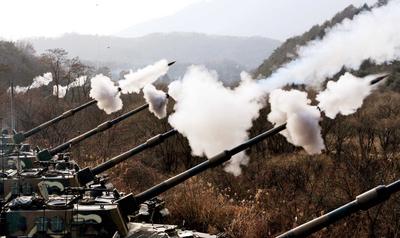For instance, it was reported that there was a secret contact in October 2009 in Singapore between the envoys from both Koreas to talk on holding the third summit meeting. The dialogue was not fruitful because both sides could not agree on the preconditions for holding the summit meeting.
On March 26th, a South Korean frigate, Cheonan, was attacked and 46 sailors lost their lives. Considering all the circumstantial and scientific evidence, the Cheonan was sunk by a torpedo launched by a North Korean submarine. South Koreans who were initially confused got furious later and inter-Korean relationships worsened further. As China declined to criticise North Korea’s provocation, the inter-Korean conflict quickly internationalised and was added as another confrontational agenda between the United States and China. The tension between Washington and Beijing heightened when China opposed unusually strongly the joint military exercise between the ROK and the US in the West Sea.
Despite sinking of the Cheonan, there was still a lingering hope about the possible summit meeting between the South and the North probably sometime in 2011. However, this hope was crushed again when the North Korean army shelled South Korean territory, Yeonpyeong Island, with their artillery on November 23rd. It was the first direct attack in a massive scale on the South Korean territory in the history of Cold War confrontation in Korea. People have become extremely enraged and, according to a poll survey, 68.6 per cent of South Koreans responded that South Korean army should have retaliated with a limited counter-attack.
Just about a week before the shelling of Yeonpyeong Island, the North Korean authorities invited a US nuclear physicist to North Korea and showed him uranium enrichment facilities. The North Koreans’ open confirmation of the existence of uranium enrichment program has baffled the international society and the future of the 6 Party Talks has become even more uncertain and complicated.
On the economic side, South Korea performed relatively well and came out of the tunnel of global economic crisis. Its economy has grown by almost 6 per cent in 2010 despite the unstable security environment. Furthermore, the South Korean political leaders aimed to contribute to the recovery and stabilisation of the global economy by hosting G20 summit meeting in November. Though it could not provide a fundamental solution to difficult issues like the global economic imbalance and the currency wars, it made a meaningful progress in restructuring the IMF, strengthening global banking regulations, and enhancing developmental assistance.
The most important challenge for the Koreans in the year 2011 will be how to reduce tensions and stabilise the inter-Korean relations. Since around two years ago, the North Korean behaviour has become much bolder and volatile. The recognition that North Korea has become a de facto nuclear power might have made the top leader think that no country would dare to hit North Korea despite their provocative behaviour. The process of power succession to a 27-year-old inexperienced leader and the unstable socio-economic domestic situation might have contributed to bolder and more frequent provocations too. At the same time, Kim Jong-il might have wanted to pressure the South and the United States to lift the sanctions against North Korea.
After all, North Korea wants to extract as much material benefits as possible from its neighbours without giving up its nuclear option. There is no indication that there will be change in any of these factors in near future. In other words, there is high probability that North Korea will continue its provocation. How to prevent Pyongyang’s provocation and maintain peace on the Korean Peninsula is the most crucial challenge in 2011.
Yoon Young-kwan is a professor at Seoul National University‘s Department of International Relations and is a former minister of Foreign Affairs and Trade (2003-04).
This is part of a special feature: 2010 in review and the year ahead.


“North Korea wants to extract as much material benefits as possible from its neighbours without giving up its nuclear option.”
Bingo. There is nothing more needs to be said, RE: North’s objectives. North Korea wants stuff. If it means swindling gullible pro-North South Koreans, or threatening anti-North South Koreans (and Japanese, Americans, and even Chinese), so be it. No matter what China claims, North is not a victim who reacts to Southern provocation; in reality, it is the aggressor who pre-empts the South’s political climate.
Will China continue to inflame long term stability by pursuing short-term “stability” gain through appeasement? Will China respect the South’s core interests and territorial integrity? Will China pursue a harmful two-Korea policy rather than a far-sighted collaborative engagement with her vulnerable, smaller neighbors? And remember, China has tried to persuade Deng Xiaoping-like reforms in the North for over a decade, with zero results to show for it.
“North Korea wants to extract as much material benefits as possible from its neighbours without giving up its nuclear option.”
Bingo again. The only thing that could change this behavior is economic reform – and this will never happen. http://www.junotane.com/analytical-updates/north-korea-risk-in-tunisia-economics.html points out that Pyongyang is probably watching Tunisia right now and thinking how ten years of economic reform and rising living standards, followed by two years of decline can quickly end authoritarian rule.